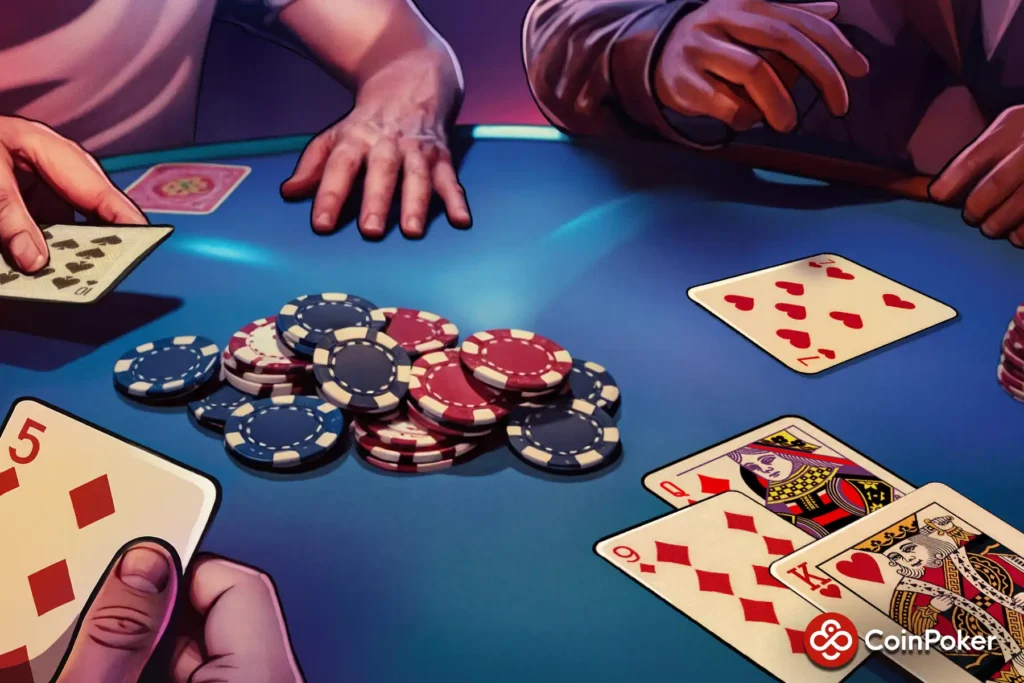Last Updated: 4 February 2026
Learn Chinese Poker Rules, How to Score Hands & Royalties
Learn about Chinese Poker, a poker variant that professionals and regulars love. Get the rules, hand rankings, scoring, and more in this guide.
Guides
Chinese Poker is fast-paced, very entertaining, and surprisingly complex. You’re constantly under pressure to organize your cards just right, and one mistake can cost you the whole round. Popular in casual settings and among high-stakes players alike, the game delivers drama every hand.
What is Chinese Poker?
Chinese Poker is a unique variation of poker where each player receives 13 cards and splits them into three poker hands: two five-card hands and one three-card hand. There’s no betting, bluffing, or chip stacks, just straight-up hand strength and correct placement. It’s more about decision-making than deception.
The game originated in Asia but gained popularity in the U.S. and Europe, particularly among professional poker players during downtime. Open-face Chinese Poker (OFC), a modern variant, helped revive interest with new twists and even more scoring possibilities. You’ll find Chinese Poker played in both casual home games and some competitive online formats.
Where Did Chinese Poker Come From?
Chinese Poker evolved out of 13-card games played across East Asia, particularly in China (Big Two) and Vietnam (Tiến lên). It gained global recognition in the 1990s and early 2000s, with pros like Barry Greenstein and Tom Dwan praising its strategic complexity. While it isn’t as widely spread as Texas Hold’em, it remains a respected offbeat poker alternative in some circles.
Chinese Poker Rules
Chinese Poker is played without betting, raises, or bluffs. Instead, you earn or lose points based on how your hands compare to other players. Each point is worth a predetermined amount of money, agreed on by the players. Every player builds three hands from 13 dealt cards:
- Front hand (3 cards)
- Middle hand (5 cards)
- Back hand (5 cards)
Your back hand must be the strongest, followed by the middle, and then the front. If you misorder them, you “foul” and lose the hand.
Making a 5-Card Hand:
You must follow standard poker hand rankings. Your back and middle hands are made of five cards and ranked as in classic poker.
Making a 3-Card Hand:
Only high card, pair, and three of a kind are valid. Straights and flushes don’t count.
Chinese Poker Gameplay
While Chinese Poker doesn’t involve multiple betting rounds, it’s still a high-pressure game. You’re racing against your opponents and yourself to arrange the best hand structure possible. Every decision matters, and small mistakes can turn a winning hand into a fouled one. The key is to stay focused and set your hands correctly from the start.
Here’s how a round of Chinese Poker typically plays out:
Each player is dealt 13 cards.
- You arrange them into three hands: front (3 cards), middle (5 cards), and back (5 cards).
- Everyone reveals their hands simultaneously.
- You compare each of your hands to the corresponding hands of every opponent.
- Points are awarded for each individual win, plus bonuses for scoops and royalties.
- Once points are calculated, the next hand begins. There’s no dealer button or small blind; it’s pure strategy from the first card to the final point tally.

Scoop / Home Run
If you win all three hands against an opponent, that’s called a scoop or home run.
It’s worth bonus points. Typically, you’ll get an extra 3 points in addition to the 3 you already won.
Fouling a Hand or Miss-setting a Hand
Setting your hands incorrectly is called fouling. If your front beats your middle, or middle beats your back, you lose the entire round to each opponent. That means they score as if they beat all three hands, plus any royalty bonuses you would’ve owed.
Surrendering a Hand
In some versions, players can surrender a hand if they believe they’ll lose. You must declare surrender before revealing your cards. You’ll lose fewer points, but give up any chance of earning royalties or scooping. This option is rarely used, but it’s there if needed.
Royalty Hands in Chinese Poker
Royalty hands are bonus combinations that earn extra points, even if you don’t win the round overall. Players must agree before the game on which royalties are allowed and how many points they’re worth.
Royalties reward strong combinations in any of the three positions. Values can vary depending on the group, but some hands, like quads or straight flushes, are always worth something.
Natural hands, like a 13-card straight, fall into a special category. These automatically win and often override the normal rules.
Chinese Poker Scoring Rules
Scoring starts by assigning a point value to each hand you win. The default system is usually 1 point per hand, per player.
Bonus scoring rules:
- 2-4 rule: 2 points for a scoop, 4 bonus points for naturals.
- 1-6 rule: 1 point per hand, 6 bonus points for scoops.
- Fouling: You lose all three hands to each opponent, giving them full points.
- Surrender: Lose fewer points than fouling, but no royalties.
- Royalties: Earned based on pre-agreed bonuses for strong hands.
- Ensure that everyone agrees on the scoring method before you begin.
Example of Scoring a Chinese Poker Hand
Here’s a quick scoring breakdown between two players:
| Player | Front | Middle | Back | Result |
|---|---|---|---|---|
| You | Pair | Flush | Trips | 2 wins |
| Opponent | High Card | Straight | Two Pair | 1 win |
You win 2 hands and lose 1 → +1 point
If you also hit a royalty (like trips in the back), you’d earn more.
Scoring Royalty Hands in Chinese Poker
Royalties vary, but most games follow a standard payout table. These bonuses apply to the individual hand, not the overall round.
Front Hand (3 cards)
• Pair of sixes – 1 unit
• Pair of sevens – 2 units
• Up to Aces – 8 units
• Three of a kind – 10 units
Middle Hand (5 cards)
• Straight – 2 units
• Flush – 4 units
• Full House – 6 units
• Four of a Kind – 10 units
• Straight Flush – 15 units
Back Hand (5 cards)
• Four of a Kind – 4 units
• Straight Flush – 10 units
• Royal Flush – 25 units
Natural Hand Bonuses
• Straight/Clean Dragon (13-card straight, no duplicates) – 13 units
• All one suit (13 flush) – 26 units
Always check the table you’re playing at to confirm the scoring model.
Basic Chinese Poker Strategy Tips
Chinese Poker isn’t about bluffing; it’s about optimizing. A few smart habits can seriously improve your win rate.
- Start with your back hand: It should be the strongest and often defines how you set the rest.
- Balance strength: Don’t overload one hand and foul the rest. A good spread wins more than a single monster hand.
- Consider scooping: If your setup gives you a realistic chance of winning all three hands, go for it.
- Track your opponents: Over time, you’ll spot patterns in how others set hands and use this to predict and counter their plays.
- Don’t chase royalties blindly: They’re tempting, but forcing a royalty can break your structure and lead to a foul.
- Practice setting hands offline: Use hand simulators or old decks to get comfortable spotting combinations under pressure.
Other Variations of Chinese Poker
Chinese Poker is played in various ways in different parts of the world. Here are some of the more popular versions of the game you may encounter in your poker travels.
- Open Face Chinese Poker (OFC)
Players place cards face-up as they receive them. The most strategic version and very popular with pros. - Pineapple OFC
A faster-paced OFC variant where players draw extra cards and discard one each round. - Fantasyland
A bonus round in OFC where a strong hand earns you all 13 cards at once in the next hand.
Where to Play Chinese Poker Online
Chinese Poker isn’t as common online as other poker formats. Many major platforms don’t offer it, or only support niche versions.
That said, CoinPoker has built a reputation for supporting unique poker games, with active communities, fair play, and crypto-powered speed.
If you want to play online poker games with real people in a secure setting, create your CoinPoker account and try it out.
FAQs
It’s a 13-card poker game where players build three hands and compare them according to typical poker hand rankings.
Royalties are bonus payouts for specific strong poker hands such as flushes, full houses, or quads
Usually, a scoop is worth 6 points total, 3 for wins, 3 as a bonus.
The 1-6 scoring system is most widely used in Chinese Poker games around the world.
They override standard rules and award big point bonuses.
Explore More
Announcements
Read recent announcements from CoinPoker about new games, ambassadors, and changes to our platform.
1 PostGuides
The go-to resource for mastering poker with expert tips and strategies. Our guides will elevate your poker skill level.
61 PostsNews
Find the latest poker news and latest CoinPoker Newsletters. Get updates about games, promotions, and crypto news.
94 PostsPromotions
Find the latest CoinPoker promotions here. Explore the crypto poker world with the best poker promotions available.
1 Post
















